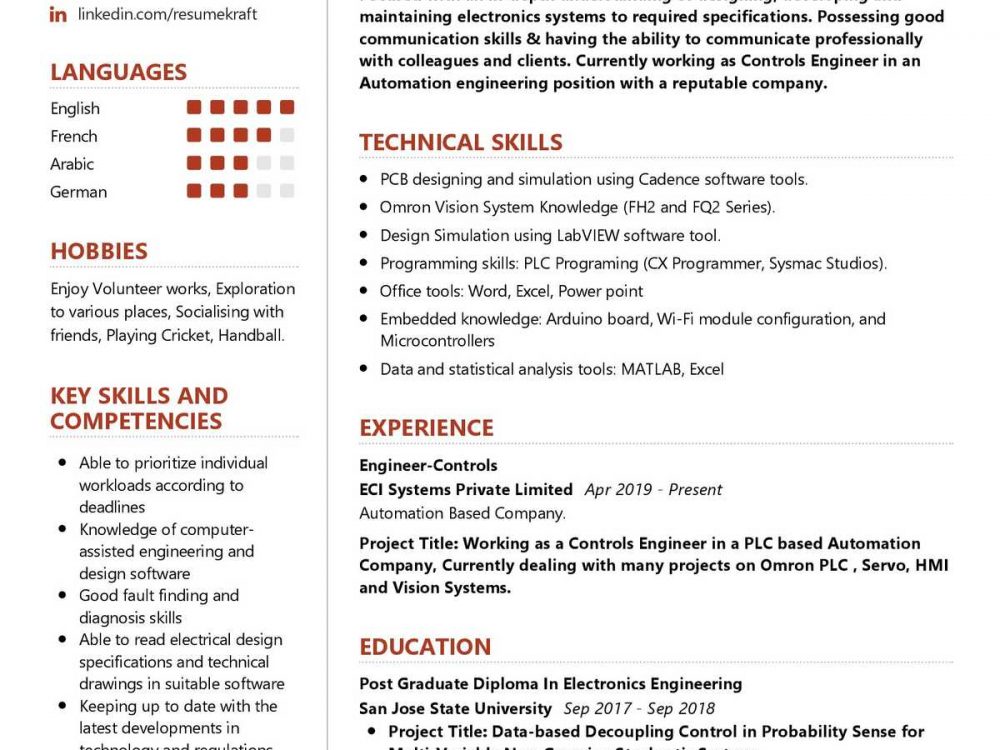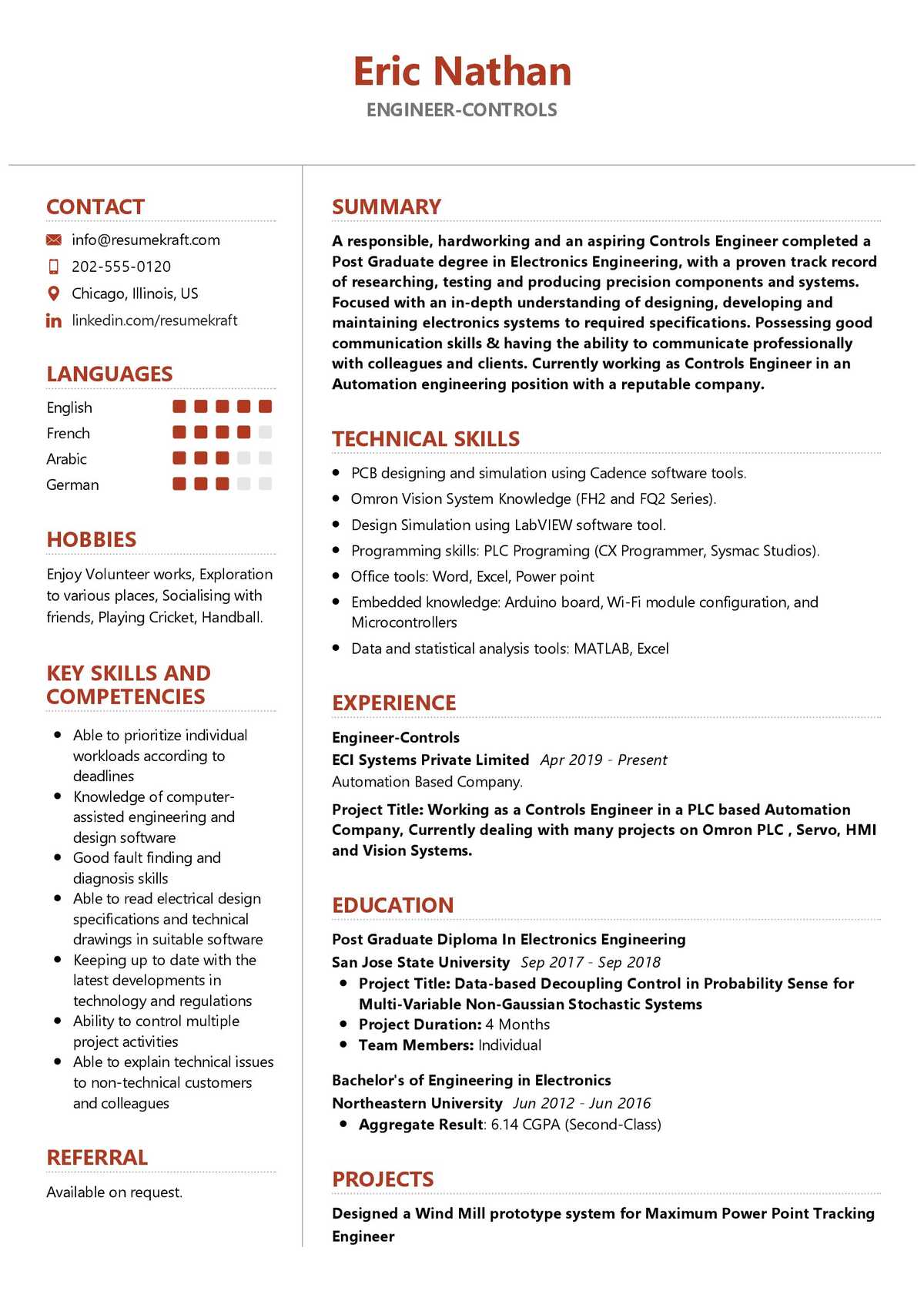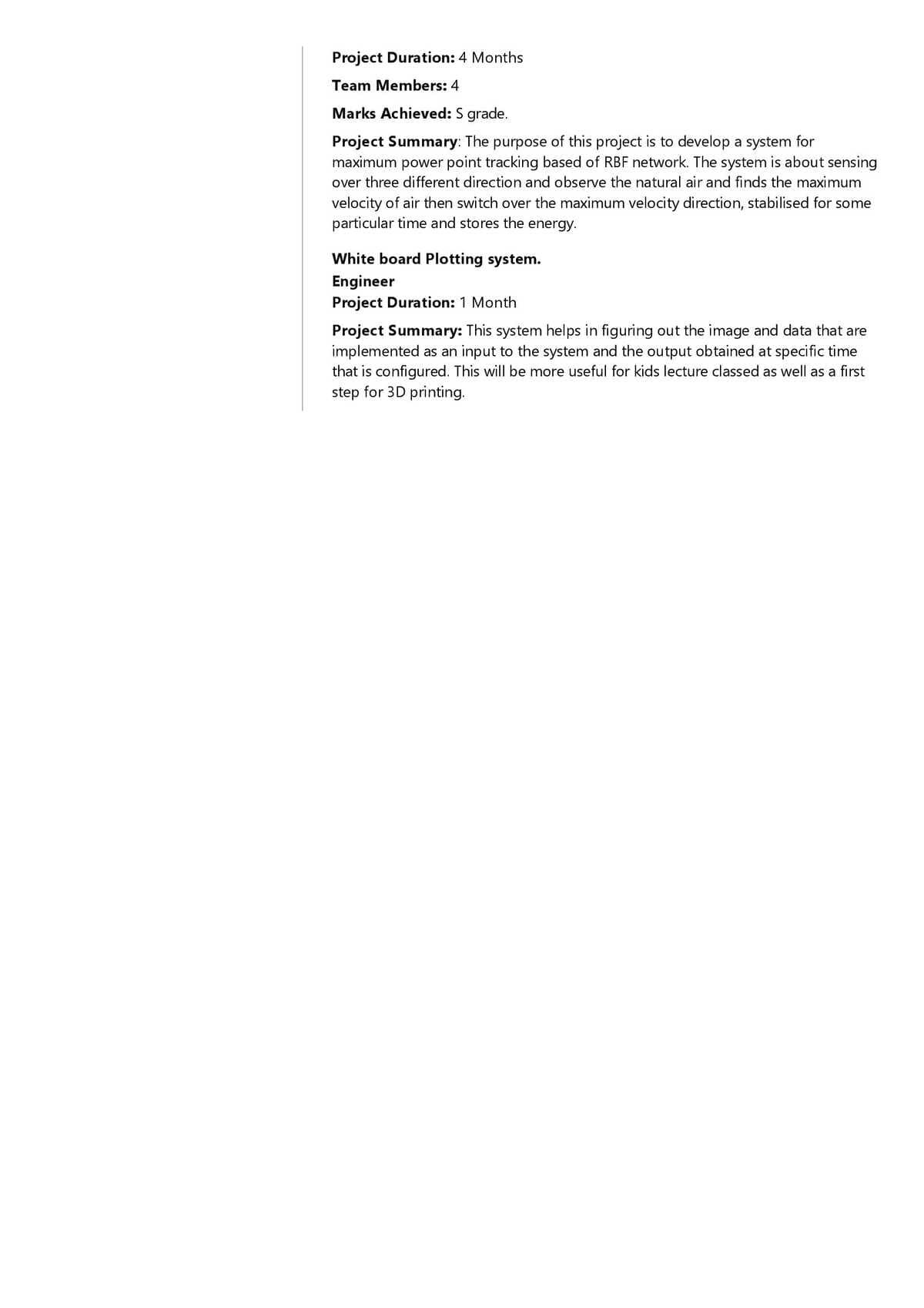Steps to write an Engineer Controls Resume
If you’re looking for a new job or a career change, it’s time to get serious about your resume. A well-written Engineer Controls resume is an essential part of the job-seeking process.
The competition for jobs is stiff because there are so many talented people looking for work. In order to stand out in the crowd and make your application memorable, it’s helpful to follow these tips from industry professionals on how to write an Engineer Controls resume that will impress employers.
The format of your resume will depend on your work history. There are three main formats: chronological (most common), functional, and hybrid. The choice of format is entirely up to you, but the most impactful resumes tend to be chronological for Engineer Controls positions. This is because employers prefer seeing a job seeker’s progression through their career, as it gives them an idea of how they’ve grown professionally and what they’ve learned along the way.
Engineer Controls Job Description:
Engineer Controls is responsible for performing design development, analysis, and testing to ensure the engineering, fabrication, installation and test of electrical equipment used to control process equipment.
Engineer Controls Responsibilities:
- Conceptualize, design, and analyze electrical control systems for process equipment
- Develop automated testing procedures for electrical control systems
- Analyze the cost-effectiveness of products against performance goals
- Design and build prototypes of electrical control systems to test their reliability and effectiveness
- Perform installation and commissioning of electric controls systems
- Create electrical schematics, drawings, and diagrams
- Design and develop software to be used in the design of electrical control systems.
- Create electrical schematics, drawings, and diagrams
- Write computer programs to simulate electrical control systems.
- Participate in product testing, debugging, and evaluation.
- Work with the marketing department to develop new products.
- Conduct research in the field of electrical control systems.
- Participate in the conceptualization, design, and development of electrical control systems for process equipment.
- Design and develop new software for use by engineers to analyze electrical control systems.
- Write computer programs to simulate the operation of electrical control systems under normal and suboptimum conditions.
- Create new testing procedures to evaluate the performance of electrical control systems.
- Work with the marketing department to develop marketing proposals, marketing letters, and press releases for new products.
Top 15 Must-have Engineer Controls Skills:
- Strong problem-solving skills
- Excellent written and oral communication skill
- Strong interpersonal skill
- Attention to detail
- Strong computer skills (MS Office, networking, web development with a specialization in websites)
- Strong mechanical skills and excellent knowledge of electrical control systems
- Able to work well under pressure, deadline demands, and aggressive schedules
- Excellent analytical skills and knowledge of engineering principles such as fluid dynamics, heat transfer, mechanical components application etc…
- Strong analytical skills and knowledge of electrical control systems
- Strong mechanical skills and excellent knowledge of electrical control systems
- Strong interpersonal skills
- Strong problem-solving skills
- Strong written and oral communication skills, with excellent grammar and punctuation skills (word processing, grammar, editing)
- Excellent computer skills (MS Office, networking, web development with a specialization in websites)
- Able to work well under pressure, deadline demands, and aggressive schedules.
What to Include in Engineer Controls Resume:
Your resume for Engineer Controls should start with the cover letter. Make sure that you mention your job prospects by stating the job title. It is wise to show how well you know the duties and responsibilities of your position. Be sure to use keywords from your resume for your cover letter.
A resume should include a list of previous jobs you have held. Think about your career background and decide which job experience you want to use as examples. Use that information to write your resume for Engineer Controls.
Your resume should include any universities you have attended in the past. List them out with a brief description of your achievements and grades, and how long you decided to pursue each program. Show which programs were relevant to your job goals or coursework for college or employment.
If you have held any leadership positions in high school, college, or employment, make sure to list them out. It is a good idea to highlight your leadership skills and provide an example of a project that you have led. You can also include any professional organizations you are affiliated with. Clearly display your achievements or contributions to the organization.
If you have taken part in any sports, hobbies, or activities, this would be a good time to put them in your Engineer Controls resume. Practice your skill and demonstrate your knowledge with detailed descriptions.
Experiences outside of work such as volunteer work will be a good addition to your Engineer Controls resume. This can show the type of person you are and how you interact with people. Volunteer opportunities can offer insight to qualities such as dependability, communication skills, and teamwork. These qualities would benefit your job search when looking for an employer for an Engineer Controls position.
Your resume should show how you will benefit the employer with your skill sets. Including related skills to the job for which you are applying would be a good idea. This can give the employer insight into how you would interact with their team and coworkers. You can also include hobbies that are related to the job or previous positions for which you have held in your Engineer Controls resume.
Using keywords within your Engineer Controls resume will help to show relevant or relevant experience. It is important that you use the keywords in the correct way. Be sure to use plural forms and do not apply abbreviations or acronyms. It is also a good idea to include your degree in a way that highlights your accomplishments with it.
The important things to mention with your Engineer Controls resume include education, certifications, and licenses. In fact, these should be at the top of your resume for readability purposes. List all certificates, licenses, and other accolades you have earned or received.
Tips to write an Engineer Controls Resume Summary:
What you have to hope for in a perfect Engineer Controls Resume summary? The most important thing is that it will be short and clear. Stop explaining how great you are at first sight. You should start right off the bat by saying what your skills are and what type of work environment you’ve managed it before. This is an important aspect of any resume as it shows that you can think for yourself on the topic of the job, instead of just regurgitating your resume blabber because it is expected to be memorized.
Summary example:
“8 years of experience in engineering controls and safety, with hands-on positions on fire suppression systems, building automation systems, SCADA systems. Experience in projects involving IT including designing security systems and installing firewalls. Strong technical writing skills.”
Tips to write an Engineer Controls Cover Letter:
- Select a resume heading that is easy to read.
- Be concise! Keep the tone professional
- Never use acronyms in a cover letter. The shorter the better.
- Keep it upbeat and enthusiastic!
- Use action verbs, not just nouns.
- Use active voice instead of passive voice.
- Do not use contractions in a cover letter. Avoid “I am writing”, instead write, “I write”.
- Include your email and phone number at the end of your cover letter. You may also add this on a separate sheet if it will fit the application’s format better.
- Proofread for typos and errors you may have missed during the first read-through.
- Select a resume heading that is easy to read.
Key Takeaways:
- Customize your resume and cover letter for the jobs that interest you. Tailor your resume every time you apply for a job.
- Hone in on the skills and experiences that make you a strong candidate for the job.
- Focus on your accomplishments.
- Use the STAR technique in your cover letter to describe projects and duties.
- Always proofread your resume and cover letter!



